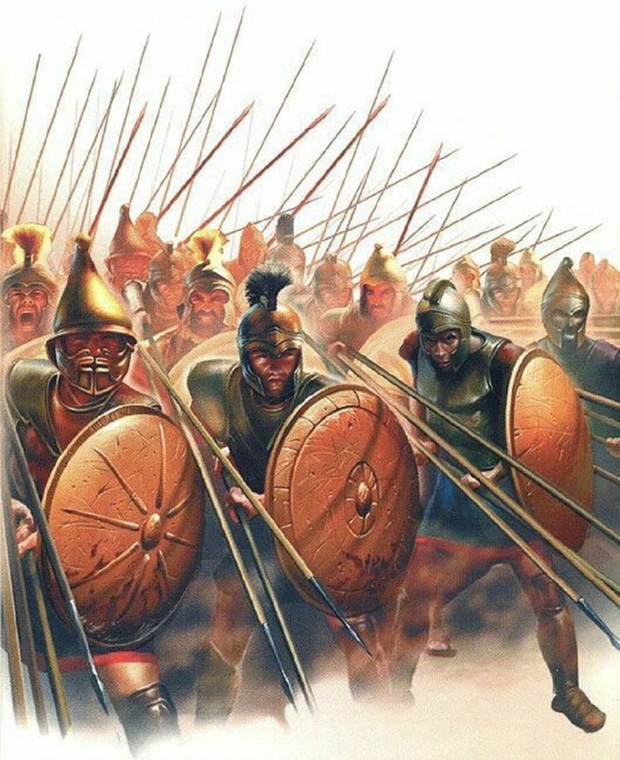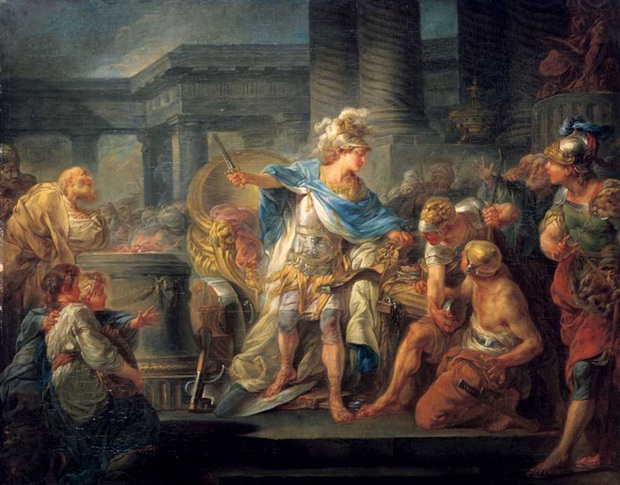Alexander the Great is one of the most remarkable generals in ancient history.
During his time, Alexander the Great was known as a great strategist, a master of military use. From the age of 16, he joined the battle and won the first victory of his life. In his twenties, he engaged Persia in a protracted battle on the mainland for control at the hands of the ancient world. This multi-year campaign brought him to Egypt in 332 BC.
At the age of 24, Alexander the Great was hailed by Egyptian subjects as a savior and hailed as a pharaoh (title indicating the kings of ancient Egypt). Its name is given to the largest port city in Egypt: Alexandria.
In order to have an everlasting history, to own rich lands and to conquer people’s hearts, Alexander the Great worked hard and fought a lot. In particular, after the death of his father – Emperor Philip II of the Kingdom of Macedonia, Alexander the Great grew strong, unable to submit, gradually became the most talented emperor in history.
What made Alexander the Great one of the greatest generals of all time? Who were your first teachers? MegallanTV will tell this story, invite readers to follow.
Alexander the Great (Alexander III) was born in 356 BC in the Kingdom of Macedonia. He was the first son of Emperor Philip II and Queen Olympias.
Emperor Philip II of the Kingdom of Macedonia was then known as a prominent military leader in Western military history. It was he who made the Macedonian army one of the most feared “combat machines” of the ancient world. The great inheritance he left to his son was the Macedonian phalanx (Macedonian phalanx).
Thanks to elite military strength and excellent reign, Emperor Philip II created the most powerful empire in history.
Therefore, his son – Alexander inherited the blood of a powerful warrior and spent his childhood years teaching both knowledge, martial arts and combat from his father and teacher.
In his life, Alexander was fortunate to have 2 great teachers to teach: it was the philosopher Aristotle and his father – Emperor Philip II.
When Alexander was 13, his father Philip II invited the famous philosopher Aristotle (384 BC-322 BC) to teach him. The great philosopher gave Alexander a rigorous and comprehensive education, preparing himself for the intended boy his father had chosen – to become the emperor to succeed his father.
Aristotle taught Alexander his love for his homeland and his country through Homer’s Greek epic poem – The Song of Ilium (Epic of the Iliad). The epic The Iliad quickly won the love of Alexander, becoming his favorite literary work. Throughout his life thereafter, Alexander carefully preserved a careful copy of this great work.
Along with the study of culture and knowledge, Alexander was taught by his father and passed on military and sword fighting strategies. Not only that, Alexander also received practical training in the battles of his father.
At the age of 16, when he was “full-fledged”, his father allowed Alexander to begin his military career. Disrespecting Emperor Philip II, he fought and defeated the Thracians in his first battle.
A few years later, in 336 BC, on the death of Emperor Philip II, Alexander replaced his father as the eminent commander of the Macedonian forces, replaced his father and ruled the country, becoming the Emperor Alexander III of the Kingdom of Macedonia.
With his combat experience, his constant learning of the emperor’s legacy, and a young hero’s desire to conquer, Alexander is confident enough to take on the Persians, an expanding empire that threatens Macedonian independence. and the Allied League of Corinth, a federation created by Emperor Philip II in 338 BC.
Before that, for over two centuries, the Achaemenid dynasty (690 BC – 328 BC) of Persia (also known as the First Persian Empire) completely dominated the Mediterranean world. As one of the first true superpowers in history, the Persian Empire stretched from the Indian border with Egypt to the northern border of Greece.
However, the persistent wish of Emperor Philip II and the desire of Emperor Alexander III to win and crush Persia caused the Persians to fail.
The mighty battle called Gaugamela (also known as the Battle of Arbela) on October 1, 331 BC between Persian Emperor Darius III and Emperor Alexander III became the final battle, decisive for the complete collapse of the ‘Empire. Persian Achaemenid dynasty at the hands of Alexander.
With his exceptional military talent, Alexander perfectly applied the Macedonian frontline training left by his father, and then quickly overwhelmed the Persian army. His submission to Persia made the name of Alexander resonate throughout the ancient world.
More than 10 years after this glorious victory, Alexander has continued to conquer the whole world. The lands of Asia Minor, Syria, Phenicia, Gaza, Egypt, Bactria and Mesopotamia were respectively subdued under the clogs of his victory and his powerful Macedonian army. The name of Alexander the Great – Alexander, a great king – is praised everywhere by Macedonian subjects.
After a particularly difficult victory at the Persian coastal outpost of present-day Lebanon, Alexander and his army reached the land of legendary Egypt.
In 332 BC, Egypt was then far from its glorious ancient monarchs. The Persian Empire previously controlled all of Egypt’s territories for many years, imposing its will on the indigenous peoples.
The news of the arrival of Alexander the Great in Egypt raised great hopes for the inhabitants of the land of the pyramids. By deploying all his forces, Alexander the Great easily defeated the Persian forces that occupied Egypt overnight. He quickly reestablished the country in ancient Egypt.
As a result, in the eyes of the Egyptian people that year, Alexander the Great quickly became the savior of the land and the people.
3 achievements of Alexander the Great in Egypt:
In just 6 months in Egypt, Alexander the Great achieved 3 great achievements here. First, he became a pharaoh, a king in the eyes of the Egyptians; and is recognized as a descendant of Amun, the supreme guardian god of the Egyptians. Second, Alexander the Great devised a new system of government, which lasted for three centuries here. It allowed the Egyptians to have a greater role in the governance of the country.
Third, he designed and built a new city, based on his name Alexandria, on the Mediterranean coast, which later became an important area for Egyptian trade and the development of that country later.
Although his stay in Egypt was not long, Alexander the Great had a great influence on the country with this extremely brilliant civilization.
For Egyptian subjects, Alexander the Great was a supreme deity. They adore him and admire him. He is present in all spheres of spiritual, political and cultural life in Egypt. His influence shaped Egypt’s next 300 years.
At the age of 32, Alexander the Great died in the palace of King Nebuchadnezzar II in Babylon due to an unexpected and mysterious illness.
For historians, no one has ignored the great influence that Alexander the Great had on the ancient world. His conquests defined the Greek era and allowed a Greek Empire to constantly expand until it fell to the power of the Roman Empire centuries after its death.




